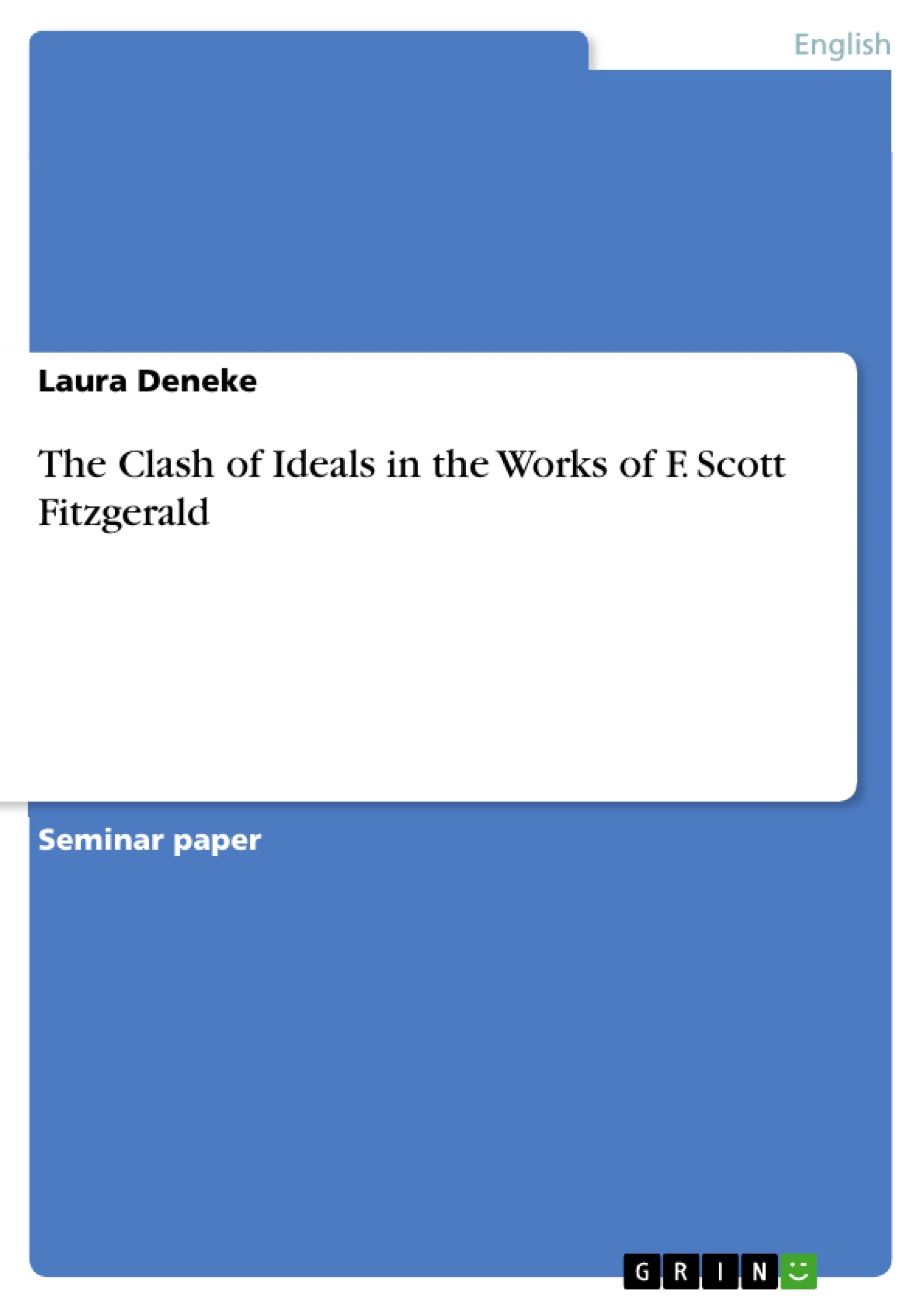Romance in connection with materialism is a recurrent theme in F. Scott Fitzgerald’s novels and the vast majority of his short stories. The heroes and heroines of his works strive for love and money with tenacity and desperation. Fitzgerald repeatedly tells the story of a poor young man falling in love with a rich and beautiful girl who rejects him for his poverty and lack of status. The author’s biography provides him with enough experience in the matter to make these accounts credible and entertaining. In the run of his career, however, Fitzgerald expands and changes his view on materialism and love.
This paper works out the ambiguity with which Fitzgerald treats both subjects and the way he gradually changes his attitude towards them. Love and money, glamour and disillusionment are interwoven and make a great part of the author’s life story. I will point out that the young worshipper of the glitter and glamour of high society turned into a sharp critic of that same world and finally, towards the end of his life, loses his obsession with the topic.
Inhaltsverzeichnis (Table of Contents)
- Introduction
- This Side of Paradise - Introducing the Golden Girl
- The Great Gatsby – Distrusting the Rich
- The rich vs. the rest
- Gatsby: Caught between materialistic and spiritual values
- Babylon Revisited
- The Last Tycoon
- Conclusion
- Works Cited
Zielsetzung und Themenschwerpunkte (Objectives and Key Themes)
This paper examines the complex relationship between materialism and spiritual values, particularly love, in the works of F. Scott Fitzgerald. It focuses on how his perspectives evolve over his career, reflecting his personal experiences and growing disillusionment with the American Dream and the allure of wealth.
- Fitzgerald's evolving views on materialism and love
- The portrayal of the "golden girl" and her role in Fitzgerald's narratives
- The clash between ambition and disillusionment in the context of wealth and societal expectations
- The influence of Fitzgerald's personal experiences on his literary works
- The transition from a romanticized view of wealth and glamour to a more critical perspective
Zusammenfassung der Kapitel (Chapter Summaries)
The first chapter delves into the introduction, presenting the main themes and objectives of the paper. The second chapter explores Fitzgerald's debut novel, "This Side of Paradise," introducing the concept of the "golden girl" through the protagonist Amory Blaine's pursuit of love and status. The third chapter examines "The Great Gatsby," highlighting Fitzgerald's increasingly critical view of the wealthy and their values. This chapter focuses on the complexities of Gatsby's character and his yearning for both material success and spiritual connection.
Schlüsselwörter (Keywords)
This paper explores themes of materialism, love, disillusionment, the American Dream, the "golden girl," F. Scott Fitzgerald, "This Side of Paradise," "The Great Gatsby," "Babylon Revisited," and "The Last Tycoon." It examines Fitzgerald's literary evolution and the influence of his personal experiences on his writing.
Frequently Asked Questions
What is the recurring theme in F. Scott Fitzgerald’s novels?
The complex relationship between romance and materialism is a central theme, often featuring a poor young man falling for a "golden girl" who rejects him due to his lack of status.
How did Fitzgerald's view on wealth change over time?
He transitioned from being a romantic worshipper of high society's glamour to a sharp critic of the wealthy class, eventually losing his obsession with the topic toward the end of his life.
What does the "golden girl" represent in his works?
The "golden girl" represents the allure of wealth, beauty, and social status, often serving as a catalyst for the protagonist's ambition and eventual disillusionment.
How is Jay Gatsby caught between values in "The Great Gatsby"?
Gatsby is caught between materialistic values (the pursuit of wealth to win Daisy) and spiritual values (his pure, romantic yearning for a lost ideal).
How did Fitzgerald's biography influence his writing?
His personal experiences with poverty, his marriage to Zelda, and his life among the rich provided him with the first-hand knowledge needed to portray the American Dream and its failures credibly.
- Quote paper
- Laura Deneke (Author), 2004, The Clash of Ideals in the Works of F. Scott Fitzgerald, Munich, GRIN Verlag, https://www.grin.com/document/65344



